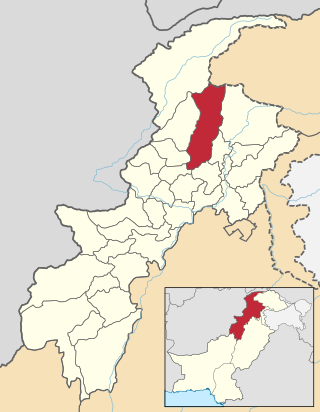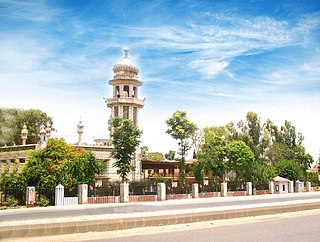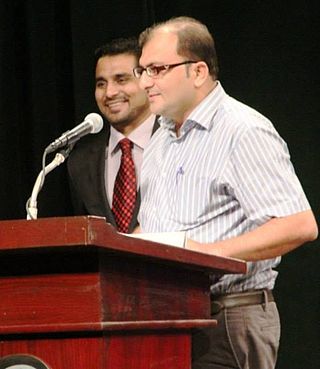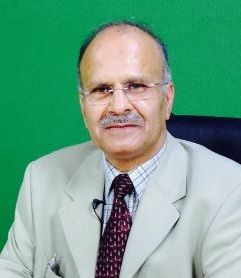
Jaish-e-Mohammed is a Pakistan-based Deobandi Jihadist terrorist group active in Kashmir. The group's primary motive is to separate Kashmir from India and merge it into Pakistan.

Javed Ahmad Ghamidi is a Pakistani philosopher, poet, educationist, and a scholar of Islam. He is also the founding President of Al-Mawrid Institute of Islamic Sciences and its sister organisation Danish Sara.

Nek Muhammad Wazir was a prominent Pakistani mujahideen or jihadi leader. He was killed in a US drone strike in South Waziristan, FATA, Pakistan in 2004. This was the first CIA drone strike inside Pakistan.

Jihadism is a neologism for militant Islamic movements that are perceived as existentially threatening to the West. It is a form of religious violence and has been applied to various insurgent Islamic extremist, militant Islamist, and terrorist individuals and organizations whose ideologies are based on the Islamic notion of lesser jihad from the classical interpretation of Islam. It has also been applied to various Islamic empires in history, such as the Rashidun and Umayyad caliphates of the early Muslim conquests, and the Ottoman Empire, who extensively campaigned against non-Muslim nations in the name of jihad.

Islamic extremism, Islamist extremism or radical Islam refers a set of extremist beliefs, behaviors and ideology within Islam. These terms remain contentious, encompassing a spectrum of definitions, ranging from academic interpretations to the notion that all ideologies other than Islam have failed and are inferior. Furthermore, these terms may extend to encompass other sects of Islam that do not share such extremist views.

The Sipah-e-Sahaba (SS), also known as the Millat-e-Islamiyya (MI), is a Anti-Shia Sunni Islamist banned Deobandi organisation in Pakistan. Founded by Pakistani cleric Haq Nawaz Jhangvi in 1989 after breaking away from Sunni Deobandi party Jamiat Ulema-e-Islam (F), it was based in Jhang, Punjab, but had offices in all of Pakistan's provinces and territories. It operated as a federal and provincial political party until it was banned and outlawed as a terrorist organization by Pakistani president Pervez Musharraf in 2002. Even though it has been banned by the Pakistani government on numerous occasions, the Sipah-e-Sahaba has continued to operate under a different name throughout the country; it has significant underground support in Punjab and Khyber Pakhtunkhwa. The organization was also banned by the United Kingdom, where there is a significant Pakistani diaspora population, in 2001.

The Pakistani Taliban, formally called the Tehreek-e-Taliban-e-Pakistan, is an umbrella organization of various Islamist armed militant groups operating along the Afghan–Pakistani border. Formed in 2007 by Baitullah Mehsud, its current leader is Noor Wali Mehsud, who has publicly pledged allegiance to the Afghan Taliban. The Pakistani Taliban share a common ideology with the Afghan Taliban and have assisted them in the 2001–2021 war, but the two groups have separate operation and command structures.
Maulvi Saif-ur Mansur was a senior Taliban commander.

The Second Battle of Swat also known as Operation Rah-e-Rast, began in May 2009 and involved the Pakistan Army and Tehrik-i-Taliban Pakistan militants in a fight for control of the Swat district of Pakistan. The first Battle of Swat had ended with a peace agreement, that the government had signed with the Tehrik-i-Taliban Pakistan in February 2009. However, by late April 2009 government troops and the Tehrik-i-Taliban Pakistan began to clash once again, and in May the government launched a military offensive code-named Operation Black Thunderstorm throughout the Swat district and elsewhere to oppose the Tehrik-i-Taliban Pakistan.

Ilyas Kashmiri, also referred to as Maulana Ilyas Kashmiri, Mufti Ilyas Kashmiri and Muhammad Ilyas Kashmiri, was a Pakistani ex-Special Forces Islamist guerrilla insurgent who fought against Indian troops in Kashmir.

Darul Uloom Haqqania or Jamia Dar al-Ulum Haqqania is an Islamic Seminary in the town of Akora Khattak, Khyber Pakhtunkhwa province, northwestern Pakistan. The seminary propagates the Hanafi Deobandi school of Sunni Islam. It was founded by Maulana Abdul Haq along the lines of the Darul Uloom Deoband seminary in India, where he had taught. It has been dubbed the "University of Jihad" due to its methods and content of instruction, along with the future occupations of its alumni. A number of leading members of the Taliban, including past chief Akhtar Mansour, studied here.

Sami ul Haq was a Pakistani religious scholar and senator. He was known as the Father of Taliban for the role his seminary Darul Uloom Haqqania played in the graduation of most Taliban leaders and commanders, having close ties to Taliban leader Mullah Mohammed Omar.

Zia Ur Rehman is a Pakistani journalist, researcher, and author, specialising in security issues, human rights, minorities, and politics.

Shabir Choudhry is a British national and a Kashmiri leader, rights and peace activist, politician, academician and writer. He helped form the Kashmir Youth Movement in 1973, the Jammu and Kashmir Liberation Front in 1976 and later on the Kashmir National Party in 2008. He resigned from each of these after being discouraged or opposed to the direction they were headed. He went to United Kingdom in 1966 where he continues his struggle against forces of occupation, terrorism, extremism and religious intolerance in Azad Kashmir and Kashmir through regular statements, articles, press releases, conference and videos. He is a British national as well as a Pakistani/Kashmiri national.
The Pakistan Armed Forces have been criticized for eroding democratic processes in Pakistan, for being the largest business conglomeration in the country and for excessive control over the domestic and foreign policies of Pakistan. Critics of the Pakistan Army, such as human rights activist Manzoor Pashteen, have been jailed while like-minded Pakistani citizens are warned against criticizing the military establishment. In Pakistan, the military is considered a part of what is known as The Establishment; they control the state through a backdoor and are a part of a working deep state.
Nizamuddin Shamzai was a pro-Taliban Pakistani Deobandi Sunni Islamic scholar and the senior professor of hadith at the Jamia Uloom-ul-Islamia. He was considered "one of the most important Deobandi figures in Pakistan" and "one" of the "most revered Sunni clerics" in Pakistan. He was the mentor of Mullah Mohammed Omar, and his madrassa, "taught many students who later became important members of the Taliban regime in Kabul". He issued religious edicts and travelled to elicit support for the Taliban, including a called for a “jihad” against the US after the Al-Qaeda September 11 attacks and US invasions of Afghanistan and Iraq.
The Pakistan Institute of Peace Studies (PIPS) is a non-governmental organization based in Islamabad, Pakistan, dedicated to promoting peace and tolerance in the country. The organization was founded in 2006 and has since then been involved in various research and advocacy activities related to peacebuilding, conflict resolution, and counter-extremism.











